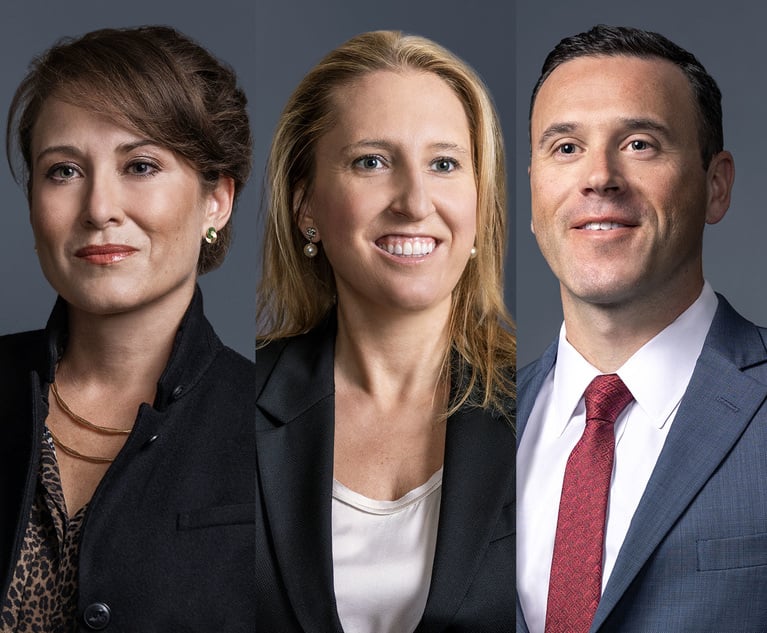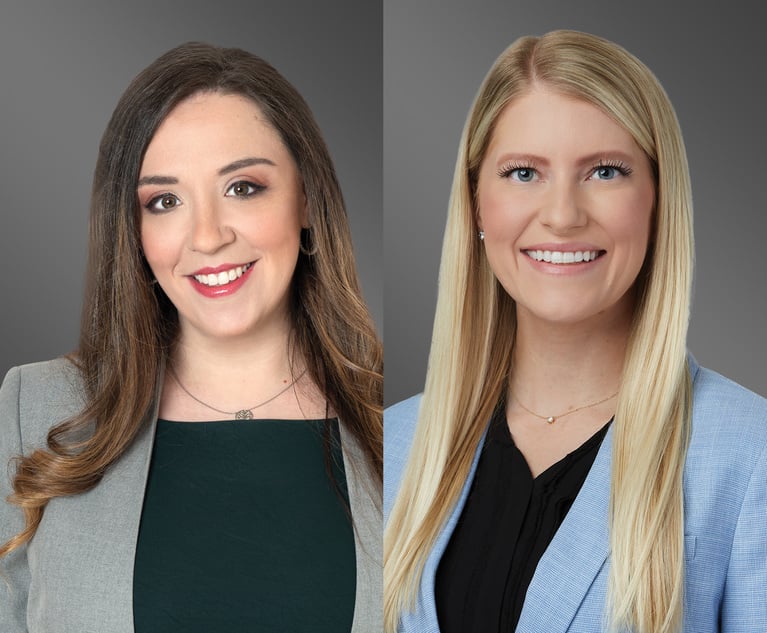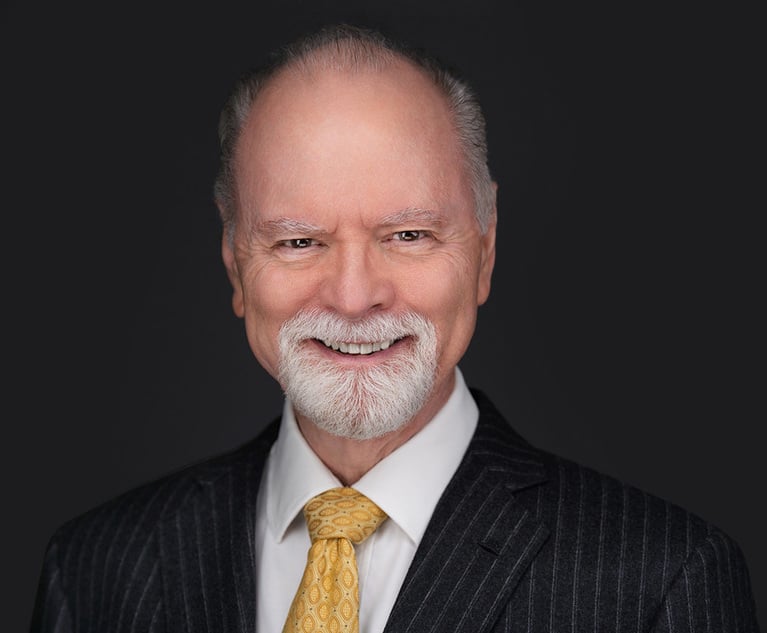On Appeals: Is 'Espy' as Precedential as the President Presumes?
At the simplest level, "Espy" appears to be at best an incomplete guide to the question of whether presidential testimony can be compelled, since the decision addressed only a document subpoena.
July 10, 2018 at 05:50 PM
9 minute read
 Charles Kagay. It warms an appellate lawyer's heart to see the decision in one of his old cases grab the public's attention. Just last month, the New York Times published a letter that President Donald Trump's counsel sent in January to Robert Mueller. Mueller is, of course, the special counsel investigating possible collusion with Russian intervention in the 2016 U.S. presidential election. The letter explains that the president has declined to be interviewed in the investigation and, more broadly, argues why the president could not be subpoenaed to testify. Practically the sole authority given for the latter conclusion was In re Sealed Case (Espy) , 121 F.3d 729 (D.C. Cir. 1997). The 1990s saw numerous independent counsel investigations carried out under a now-sunsetted statute passed in the wake of the Watergate scandal. I was chief appellate counsel for the Office of Independent Counsel (OIC) in two of those investigations, including that of Mike Espy, President Bill Clinton's first Secretary of Agriculture. Espy was accused of taking gratuities from companies and individuals subject to the department's regulation. The Espy decision concerned a grand jury subpoena ordering the White House counsel to turn over documents. At the president's direction, the White House counsel had conducted an investigation of the allegations against Espy that to some extent paralleled the OIC's investigation. The White House counsel's report was made public in October 1994, shortly after Espy announced his resignation. Three days later, the grand jury taking evidence in the OIC's investigation issued a subpoena to the White House counsel, demanding all documents related to the counsel's report to the president. The White House produced several folders of responsive documents but withheld over 80 documents on the ground of executive privilege. The OIC moved in the district court to compel production of the withheld documents. The district court reviewed the documents in camera and denied the motion, without much explanation. An appeal to the U.S. Court of Appeals for the D.C. Circuit soon followed. At some stage, the court must have viewed the case as a routine matter. The initial notice of hearing indicated that each side would be given a mere five minutes to argue, not unusual for review of a subpoena enforcement motion. I came to court expecting to have to distill a heady constitutional dispute into a few critical points. At some juncture, though, the court came to view the Espy case as an occasion to lay out detailed guidelines on the parameters of executive privilege. When we arrived at the courtroom, the clerk informed us that the court had doubled the argument time to 10 minutes per side. The courtroom was cleared of everyone not involved in the case and the doors locked (because it was a grand jury matter), and the court then conducted a thorough questioning of both sides for more than two hours. Ultimately, the court issued a 34-page decision (originally sealed but later unsealed) analyzing the law of presidential executive privilege from Marbury v. Madison through the multiple controversies surrounding President Richard Nixon and beyond. The court concluded that the withheld documents were protected by the privilege, but that the privilege is qualified and so the documents might be subject to production. It remanded the matter to the district court for both sides to make further showings consistent with its decision. Ultimately, the district court held that most of the subject documents must be produced, and the White House complied in 1998, almost four years after the subpoena was issued. It was perhaps no surprise that, in his January letter to Mueller declining a presidential interview, the president's counsel related: “In deciding whether to advise the President to be interviewed, we are guided by the controlling law in this Circuit … the ' Espy ' case.” The specific Espy holding relied on was that anyone seeking information from the president must “demonstrate with specificity why it is likely that the subpoenaed materials [here, his testimony] contain important evidence and why this evidence, or equivalent evidence, is not practically available from another source.” This is, indeed, a key holding of the decision. At the simplest level, though, Espy appears to be at best an incomplete guide to the question of whether presidential testimony can be compelled, since the decision addressed only a document subpoena. The decision's detailed history of executive privilege discusses a few instances in which the president's testimony was sought, but those earlier instances appear inconclusive. At another level, as well, the president's counsel's letter seems to gloss over a key point. Espy identified two different forms of executive privilege: the deliberative process privilege and the presidential communications privilege. The Espy court based its decision entirely on the latter. In contrast, the presidential communications privilege is a constitutional privilege, rooted in the president's unique constitutional role, which the president may invoke to preserve the confidentiality of presidential communications. Unlike the deliberative process privilege, it is infrequently invoked, and so the subject of scant case law. In Espy , the White House claimed both privileges but, in the end, the court evaluated the claim only under the presidential communications privilege. This was because, although both the deliberative process privilege and the presidential privilege are qualified privileges, the available case law suggested that the presidential communications privilege is the more difficult for the party seeking evidence to surmount. In Espy, the appellate court had before it the withheld documents, which the White House had submitted for review. The court was therefore in a good position to evaluate whether they were subject to the privilege. The present controversy concerns Mueller's desire to interview or examine the president. The specific questions Mueller might ask are unknown. However, the president's counsel's letter identifies 12 topics that, he represents, the special counsel's office had earlier identified as areas it wanted to explore with the president. The topics touch on such matters as former National Security Adviser Michael Flynn's contacts with the Russian ambassador during the confirmation process; the firing of FBI Director James Comey; and a publicly issued statement the president drafted concerning his son's meeting with Russians, in which the Russian government was allegedly involved. Some of the listed topics could readily lend themselves to questions that delve into presidential communications. For example, one such topic is “information related to conversations with intelligence officials generally regarding ongoing investigations.” In all likelihood, though, questions could also be asked about that topic that would not require the divulgence of the content of presidential communications. For any questions not giving rise to the presidential communications privilege, Espy provides limited authority for the president to decline to testify. To the extent that the decision discusses the deliberative process privilege at all, the decision emphasizes the privilege's limited sweep. The decision notes that material must be predecisional and deliberative to be protected. The privilege generally does not shield documents that simply state or explain a decision the government has already made or protect material that is purely factual. Moreover, the court emphasized, where there is reason to believe the documents sought may shed light on government misconduct, the privilege is routinely denied, because it would not serve “the public's interest in honest, effective government.” Thus, if the question of the current president's susceptibility to subpoena were to find its way into court, the Espy decision might not prove to be as definitive as the president's counsel professes to believe. However, on at least one point not mentioned in his letter, the decision might supply an answer. On various occasions, the president has publicly announced a personal inclination to sit for questioning by the special counsel. Has he thereby waived his privileges? In Espy , the White House initially announced that it would comply with the grand jury's subpoena, and the OIC urged that this amounted to a waiver of privilege. The Espy decision held, however, that the implied waiver was nonspecific and nonprejudicial, and that because of the importance of executive privilege, “a waiver should not be lightly inferred.” So, intriguing as the question might be, this likely is not an occasion on which a court would examine the possibility of waiver via Twitter. On Appeals is a monthly column by the attorneys of the California Appellate Law Group LLP, the largest appellate specialty boutique in Northern California. Charles Kagay is of counsel with the firm. He has decades of experience handling appeals that involve complex or novel legal questions and is certified by the State Bar as a California appellate specialist. Find out more about Charles and the California Appellate Law Group at www.calapplaw.com .
Charles Kagay. It warms an appellate lawyer's heart to see the decision in one of his old cases grab the public's attention. Just last month, the New York Times published a letter that President Donald Trump's counsel sent in January to Robert Mueller. Mueller is, of course, the special counsel investigating possible collusion with Russian intervention in the 2016 U.S. presidential election. The letter explains that the president has declined to be interviewed in the investigation and, more broadly, argues why the president could not be subpoenaed to testify. Practically the sole authority given for the latter conclusion was In re Sealed Case (Espy) , 121 F.3d 729 (D.C. Cir. 1997). The 1990s saw numerous independent counsel investigations carried out under a now-sunsetted statute passed in the wake of the Watergate scandal. I was chief appellate counsel for the Office of Independent Counsel (OIC) in two of those investigations, including that of Mike Espy, President Bill Clinton's first Secretary of Agriculture. Espy was accused of taking gratuities from companies and individuals subject to the department's regulation. The Espy decision concerned a grand jury subpoena ordering the White House counsel to turn over documents. At the president's direction, the White House counsel had conducted an investigation of the allegations against Espy that to some extent paralleled the OIC's investigation. The White House counsel's report was made public in October 1994, shortly after Espy announced his resignation. Three days later, the grand jury taking evidence in the OIC's investigation issued a subpoena to the White House counsel, demanding all documents related to the counsel's report to the president. The White House produced several folders of responsive documents but withheld over 80 documents on the ground of executive privilege. The OIC moved in the district court to compel production of the withheld documents. The district court reviewed the documents in camera and denied the motion, without much explanation. An appeal to the U.S. Court of Appeals for the D.C. Circuit soon followed. At some stage, the court must have viewed the case as a routine matter. The initial notice of hearing indicated that each side would be given a mere five minutes to argue, not unusual for review of a subpoena enforcement motion. I came to court expecting to have to distill a heady constitutional dispute into a few critical points. At some juncture, though, the court came to view the Espy case as an occasion to lay out detailed guidelines on the parameters of executive privilege. When we arrived at the courtroom, the clerk informed us that the court had doubled the argument time to 10 minutes per side. The courtroom was cleared of everyone not involved in the case and the doors locked (because it was a grand jury matter), and the court then conducted a thorough questioning of both sides for more than two hours. Ultimately, the court issued a 34-page decision (originally sealed but later unsealed) analyzing the law of presidential executive privilege from Marbury v. Madison through the multiple controversies surrounding President Richard Nixon and beyond. The court concluded that the withheld documents were protected by the privilege, but that the privilege is qualified and so the documents might be subject to production. It remanded the matter to the district court for both sides to make further showings consistent with its decision. Ultimately, the district court held that most of the subject documents must be produced, and the White House complied in 1998, almost four years after the subpoena was issued. It was perhaps no surprise that, in his January letter to Mueller declining a presidential interview, the president's counsel related: “In deciding whether to advise the President to be interviewed, we are guided by the controlling law in this Circuit … the ' Espy ' case.” The specific Espy holding relied on was that anyone seeking information from the president must “demonstrate with specificity why it is likely that the subpoenaed materials [here, his testimony] contain important evidence and why this evidence, or equivalent evidence, is not practically available from another source.” This is, indeed, a key holding of the decision. At the simplest level, though, Espy appears to be at best an incomplete guide to the question of whether presidential testimony can be compelled, since the decision addressed only a document subpoena. The decision's detailed history of executive privilege discusses a few instances in which the president's testimony was sought, but those earlier instances appear inconclusive. At another level, as well, the president's counsel's letter seems to gloss over a key point. Espy identified two different forms of executive privilege: the deliberative process privilege and the presidential communications privilege. The Espy court based its decision entirely on the latter. In contrast, the presidential communications privilege is a constitutional privilege, rooted in the president's unique constitutional role, which the president may invoke to preserve the confidentiality of presidential communications. Unlike the deliberative process privilege, it is infrequently invoked, and so the subject of scant case law. In Espy , the White House claimed both privileges but, in the end, the court evaluated the claim only under the presidential communications privilege. This was because, although both the deliberative process privilege and the presidential privilege are qualified privileges, the available case law suggested that the presidential communications privilege is the more difficult for the party seeking evidence to surmount. In Espy, the appellate court had before it the withheld documents, which the White House had submitted for review. The court was therefore in a good position to evaluate whether they were subject to the privilege. The present controversy concerns Mueller's desire to interview or examine the president. The specific questions Mueller might ask are unknown. However, the president's counsel's letter identifies 12 topics that, he represents, the special counsel's office had earlier identified as areas it wanted to explore with the president. The topics touch on such matters as former National Security Adviser Michael Flynn's contacts with the Russian ambassador during the confirmation process; the firing of FBI Director James Comey; and a publicly issued statement the president drafted concerning his son's meeting with Russians, in which the Russian government was allegedly involved. Some of the listed topics could readily lend themselves to questions that delve into presidential communications. For example, one such topic is “information related to conversations with intelligence officials generally regarding ongoing investigations.” In all likelihood, though, questions could also be asked about that topic that would not require the divulgence of the content of presidential communications. For any questions not giving rise to the presidential communications privilege, Espy provides limited authority for the president to decline to testify. To the extent that the decision discusses the deliberative process privilege at all, the decision emphasizes the privilege's limited sweep. The decision notes that material must be predecisional and deliberative to be protected. The privilege generally does not shield documents that simply state or explain a decision the government has already made or protect material that is purely factual. Moreover, the court emphasized, where there is reason to believe the documents sought may shed light on government misconduct, the privilege is routinely denied, because it would not serve “the public's interest in honest, effective government.” Thus, if the question of the current president's susceptibility to subpoena were to find its way into court, the Espy decision might not prove to be as definitive as the president's counsel professes to believe. However, on at least one point not mentioned in his letter, the decision might supply an answer. On various occasions, the president has publicly announced a personal inclination to sit for questioning by the special counsel. Has he thereby waived his privileges? In Espy , the White House initially announced that it would comply with the grand jury's subpoena, and the OIC urged that this amounted to a waiver of privilege. The Espy decision held, however, that the implied waiver was nonspecific and nonprejudicial, and that because of the importance of executive privilege, “a waiver should not be lightly inferred.” So, intriguing as the question might be, this likely is not an occasion on which a court would examine the possibility of waiver via Twitter. On Appeals is a monthly column by the attorneys of the California Appellate Law Group LLP, the largest appellate specialty boutique in Northern California. Charles Kagay is of counsel with the firm. He has decades of experience handling appeals that involve complex or novel legal questions and is certified by the State Bar as a California appellate specialist. Find out more about Charles and the California Appellate Law Group at www.calapplaw.com .This content has been archived. It is available through our partners, LexisNexis® and Bloomberg Law.
To view this content, please continue to their sites.
Not a Lexis Subscriber?
Subscribe Now
Not a Bloomberg Law Subscriber?
Subscribe Now
NOT FOR REPRINT
© 2025 ALM Global, LLC, All Rights Reserved. Request academic re-use from www.copyright.com. All other uses, submit a request to [email protected]. For more information visit Asset & Logo Licensing.
You Might Like
View All
M&A Transactions and AB 1824: Navigating New Privacy Compliance Challenges
7 minute read
What Will It Mean in California if New Federal Anti-SLAPP Legislation Passes?
9 minute readTrending Stories
- 1Uber Files RICO Suit Against Plaintiff-Side Firms Alleging Fraudulent Injury Claims
- 2The Law Firm Disrupted: Scrutinizing the Elephant More Than the Mouse
- 3Inherent Diminished Value Damages Unavailable to 3rd-Party Claimants, Court Says
- 4Pa. Defense Firm Sued by Client Over Ex-Eagles Player's $43.5M Med Mal Win
- 5Losses Mount at Morris Manning, but Departing Ex-Chair Stays Bullish About His Old Firm's Future
Who Got The Work
J. Brugh Lower of Gibbons has entered an appearance for industrial equipment supplier Devco Corporation in a pending trademark infringement lawsuit. The suit, accusing the defendant of selling knock-off Graco products, was filed Dec. 18 in New Jersey District Court by Rivkin Radler on behalf of Graco Inc. and Graco Minnesota. The case, assigned to U.S. District Judge Zahid N. Quraishi, is 3:24-cv-11294, Graco Inc. et al v. Devco Corporation.
Who Got The Work
Rebecca Maller-Stein and Kent A. Yalowitz of Arnold & Porter Kaye Scholer have entered their appearances for Hanaco Venture Capital and its executives, Lior Prosor and David Frankel, in a pending securities lawsuit. The action, filed on Dec. 24 in New York Southern District Court by Zell, Aron & Co. on behalf of Goldeneye Advisors, accuses the defendants of negligently and fraudulently managing the plaintiff's $1 million investment. The case, assigned to U.S. District Judge Vernon S. Broderick, is 1:24-cv-09918, Goldeneye Advisors, LLC v. Hanaco Venture Capital, Ltd. et al.
Who Got The Work
Attorneys from A&O Shearman has stepped in as defense counsel for Toronto-Dominion Bank and other defendants in a pending securities class action. The suit, filed Dec. 11 in New York Southern District Court by Bleichmar Fonti & Auld, accuses the defendants of concealing the bank's 'pervasive' deficiencies in regards to its compliance with the Bank Secrecy Act and the quality of its anti-money laundering controls. The case, assigned to U.S. District Judge Arun Subramanian, is 1:24-cv-09445, Gonzalez v. The Toronto-Dominion Bank et al.
Who Got The Work
Crown Castle International, a Pennsylvania company providing shared communications infrastructure, has turned to Luke D. Wolf of Gordon Rees Scully Mansukhani to fend off a pending breach-of-contract lawsuit. The court action, filed Nov. 25 in Michigan Eastern District Court by Hooper Hathaway PC on behalf of The Town Residences LLC, accuses Crown Castle of failing to transfer approximately $30,000 in utility payments from T-Mobile in breach of a roof-top lease and assignment agreement. The case, assigned to U.S. District Judge Susan K. Declercq, is 2:24-cv-13131, The Town Residences LLC v. T-Mobile US, Inc. et al.
Who Got The Work
Wilfred P. Coronato and Daniel M. Schwartz of McCarter & English have stepped in as defense counsel to Electrolux Home Products Inc. in a pending product liability lawsuit. The court action, filed Nov. 26 in New York Eastern District Court by Poulos Lopiccolo PC and Nagel Rice LLP on behalf of David Stern, alleges that the defendant's refrigerators’ drawers and shelving repeatedly break and fall apart within months after purchase. The case, assigned to U.S. District Judge Joan M. Azrack, is 2:24-cv-08204, Stern v. Electrolux Home Products, Inc.
Featured Firms
Law Offices of Gary Martin Hays & Associates, P.C.
(470) 294-1674
Law Offices of Mark E. Salomone
(857) 444-6468
Smith & Hassler
(713) 739-1250








